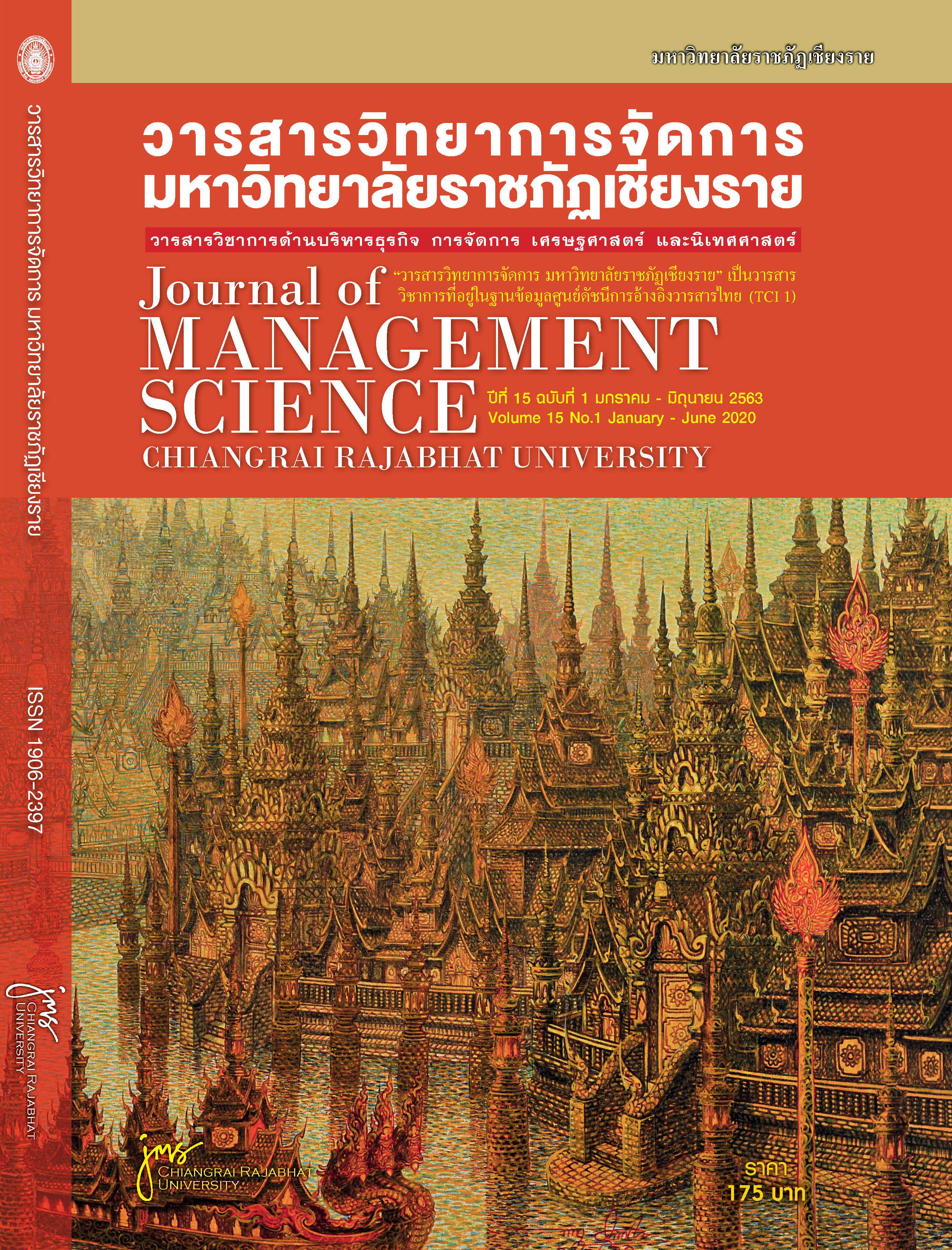ความสัมพันธ์ระหว่างการปฏิบัติตามหลักปรัชญาเศรษฐกิจพอเพียง และผลการดำเนินงานของธุรกิจด้วยการวัดผลเชิงดุลยภาพ : กรณีศึกษาธุรกิจขนาดกลางและย่อมในจังหวัดสงขลา
Main Article Content
บทคัดย่อ
การศึกษาครั้งนี้ มีวัตถุประสงค์ในการศึกษาระดับการปฏิบัติตามหลักปรัชญาเศรษฐกิจพอเพียงและผล การดำเนินงานของธุรกิจด้วยตัววัดผลเชิงดุลยภาพของธุรกิจขนาดกลางและย่อมในจังหวัดสงขลา และทดสอบความสัมพันธ์ระหว่างการปฏิบัติตามหลักปรัชญาเศรษฐกิจพอเพียงและผลการดำเนินงานของธุรกิจ ประชากรและกลุ่มตัวอย่างที่ใช้ คือ ธุรกิจขนาดกลางและย่อมในจังหวัดสงขลา โดยการศึกษาใช้การวิเคราะห์ข้อมูลด้วยวิธีเชิงพรรณนา และการวิเคราะห์ข้อมูลเชิงพหุ ผลการศึกษาพบว่า ระดับการปฏิบัติตามหลักปรัชญาเศรษฐกิจพอเพียงทั้ง 5 ด้าน คือ ด้านความพอประมาณ ด้านการมีเหตุผล ด้านการมีภูมิคุ้มกันภัย ด้านความรู้ และด้านคุณธรรม อยู่ในระดับมาก นอกจากนี้ ระดับผลการดำเนินงานของธุรกิจด้วยตัววัดผลเชิงดุลยภาพทั้ง 4 ด้าน ได้แก่ ด้านการเงิน ด้านลูกค้า ด้านกระบวนการภายใน และด้านการเรียนรู้และพัฒนาอยู่ในระดับมากเช่นกัน นอกจากนี้ ผลการศึกษาพบความสัมพันธ์เชิงบวกระหว่างการปฏิบัติตามหลักปรัชญาเศรษฐกิจพอเพียง ด้านการมีเหตุผล ด้านการมีภูมิคุ้มกันภัย ด้านความรู้ และด้านคุณธรรมกับผลการดำเนินงานของธุรกิจแบบดุลยภาพที่ระดับความสำคัญ
Article Details
ทัศนะและข้อคิดเห็นของบทความที่ปรากฏในวารสารฉบับนี้เป็นของผู้เขียนแต่ละท่าน ไม่ถือว่าเป็นทัศนะและความรับผิดชอบของกองบรรณาธิการ
เอกสารอ้างอิง
Avery, G. C. (2005). Leadership for sustainable futures: achieving success in a competitive world. Cheltenham, U.K. : Edward Elgar Publishing.
Cronbach, L.J. (1951). Coefficient alpha and the internal structure of tests. Psychometric. 16(1). 297-334.
Decharin, P. (2004). Implementing balance scorecard (4th ed.). Bangkok : Chulalongkorn University. (in Thai)
Hatetong, P. (2016). The relationship between ownership structure, environment, and performance measurement of finance and non-finance. In Research for Well-Being. 156-163. July 7-8, 2016, Walairuk University. Nakhonsithammarat : Walairuk University. (in Thai)
Kantabutra, S. (2006). Relating vision-based leadership to sustainable business performance: a Thai perspective. Kravis Leadership Institute Leadership Review. 6(Spring). 37-53. (in Thai)
Kantabutra, S. (2010). Suffiency economy philosophy practices in business sector for sustainability. Bangkok : National Institute of Development Admistration (NIDA). (in Thai)
Kantabutra, S. (2010). Philosophy of suffiency economy in business and sustainable development. Human Resource Management by Sufficiency Economy Philosophy. 4(1). 143-185. (in Thai)
Mongsawad, P. (2010). The philosophy of the sufficiency economy: a contribution to the theory of development. Asia-Pacific Development Journal. 17(1). 123–143. (in Thai)
Nindum, S & Rattanasimakul, K. (2017). The Diffusion of Philosophy of the Economic Sufficiency
in Thai Mass Media, and Understanding and Acceptance of People in Chiang Rai Province. Journal of Management Science Chiang Rai Rajabhat University. 12(1). 1-34. (in Thai)
Nuttavuthisit, K. (2005). Applying sufficiency economy philosophy in business organizations: a case of Panda Jewelry. Bangkok : Office of National Economic and Social Development Board. (in Thai)
Office of small & medium enterprises promotion (OSMEP). (2017). Small and Medium Sized Enterprise Situation Report. Retrieved November 8, 2017, from www.sme.go.th. (in Thai)
Pruetipibultham, O. (2010). The sufficiency economy philosophy and strategic HRD : a sustainable development for Thailand. Human Resource Development International. 13(1). 99-110. (in Thai)
Silpcharu, T. (2010). Research and statistical analysis by SPSS (11st ed.). Bangkok : S.R. Printing Mass Product. (in Thai)
Suriyankietkaew, S. & Avery, G. (2016). Sustainable leadership practices driving financial performance: empirical evidence from Thai SMEs. Sustainability. 8(1). 1-14. (in Thai)
Suttipun, M. (2014). Corporate characteristics, CSR reporting, and firm financial performance: an evidence of Thailand. Corporate Ownership and Control. 12(1). 844-855. (in Thai)
Suttipun, M. & Saefu, S. (2017). Investigation of sufficiency economy philosophy reporting in Thailand. DLSU Business & Economics Review. 26(2). 53-65. (in Thai)
Suttipun, M. & Sittidate, N. (2016). Corporate social responsibility reporting and operation performance of listed companies in the Stock Exchange of Thailand. Songklanakarin Journal of Social Sciences and Humanities. 22(1). 269-295. (in Thai)
Teeratanachaikul, K. (2010). Performance measurement by balance scorecards in software industry. Srinakharinwirot Business Journal. 2(1). 135-147. (In Thai)
ThaiPat Institute. (2017). The KPI’s of Sustainable Development Reporting of Listed Company in the Stock Exchange of Thailand. Retrieved October 3, 2017, from www.thaipat.org. (in Thai)
Yamane, T. (1973). Statistic: An Introductory Analysis (3nd ed.). New York : Harper and Row.


